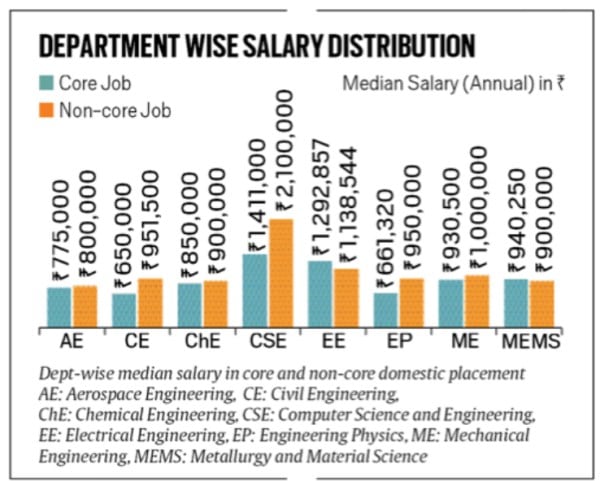Over 60% IIT Bombay graduates opting for jobs not linked to their branch
“This trend also raises the important question: why are we spending so much on engineering training that is ‘misallocated’ subsequently,” states the paper authored by Namit Agrawal, Sailakshmi Sreenath, Shishir K Jha and Anurag Mehra of the Centre for Policy Studies, IIT-Bombay.
 Another factor is that non-core companies get the earliest slots during placement season. “Despite their interest in core companies, some students give in to the pressure of getting placement ‘at the earliest’ and finally choose non-core companies to avoid a stressful situation,” it notes.
Another factor is that non-core companies get the earliest slots during placement season. “Despite their interest in core companies, some students give in to the pressure of getting placement ‘at the earliest’ and finally choose non-core companies to avoid a stressful situation,” it notes. Between 2014 and 2018, over 60% of IIT-Bombay graduates took up jobs in sectors not related to their branches of study, a trend seen across all disciplines except Computer Science and Engineering (CSE) and Electrical Engineering (EE), according to a study by a group of researchers from the Centre for Policy Studies, IIT-Bombay.
However, contrary to popular perception, higher salaries “may not be the dominant factor” affecting the choices, according to the study published in the Current Science journal. Citing “other factors”, the study points to “cultural issues”, causing students to focus more on “extracurricular activities” instead of academics, leading to many being “underprepared for core jobs requiring domain knowledge”. It also cites “pressure of getting placement at the earliest” as one of the reasons.
“This trend also raises the important question: why are we spending so much on engineering training that is ‘misallocated’ subsequently,” states the paper authored by Namit Agrawal, Sailakshmi Sreenath, Shishir K Jha and Anurag Mehra of the Centre for Policy Studies, IIT-Bombay.
The findings of the five-year study are based on placement data of 2,109 students. And the factors behind their choices were identified on the basis of responses from 269 of these 2,109 students.
For the purpose of the study, the authors of the paper define core jobs as roles which have some connection with the engineering discipline of the student. Hence, any job – irrespective of the sector the company belongs to — that requires domain knowledge taught in a given branch is considered as ‘core’ for that branch. “Chemical industries also hire mechanical and electrical engineers for the maintenance and upkeep of equipment. So, even though such engineers may work in the chemical industry, their job requires knowledge of their respective disciplines,” the paper states.
The study identifies Computer Science and Engineering (CSE) and Electrical Engineering (EE) as the only disciplines where core jobs continue to dominate. In CSE, 82.71% of the jobs picked by students fell in core sectors; in EE, it was 53.81%.

The paper points out that CSE, in many ways, is an outlier as it is “a world so driven by computers and computing that it enables a CSE graduate to fit into almost any sector”.
But in nearly all other branches, students opted for non-core jobs, unrelated to their branch of study. Aerospace Engineering (AE) topped the list with 87.04% opting for non-core jobs, followed by Metallurgical Engineering and Materials Science (MEMS) at 86.93%, Engineering Physics (EP) at 75.68%, Civil Engineering (CE) at 68.97%, Chemical Engineering (ChE) at 65.11%, and Mechanical Engineering (ME) at 54.57%.
Stating that students are not just driven by the lure of higher salaries in their decision making, the study points out that there is marginal difference in median salaries in core and non-core jobs across most disciplines.
For instance, in Mechanical Engineering, the median salary of core jobs is Rs 10 lakh per annum, while it is Rs 9.30 lakh in non-core jobs. In Chemical Engineering, the median salary of core jobs is Rs 8.50 lakh, while it is Rs 9 lakh in non-core jobs.

“Contrary to popular belief, median salaries for core and non-core jobs were similar for most departments, except for Computer Science Engineering, Engineering Physics and Civil Engineering,” says the paper, adding that “other factors are at play in deciding the core versus non-core choices”.
According to the study, there are inherent “cultural issues”, with many students being influenced by the “glorification” of positions of responsibility and extracurricular activities. “Around 54.4% of students mentioned that their placement choices were affected by such a culture… This glorification encourages students to focus more on extracurricular activities relative to academics, leading to many being underprepared for core jobs requiring domain knowledge,” it says.
Another factor is that non-core companies get the earliest slots during placement season. “Despite their interest in core companies, some students give in to the pressure of getting placement ‘at the earliest’ and finally choose non-core companies to avoid a stressful situation,” it notes.
Speaking to The Indian Express, Prof Mehra, one of the authors of the study, said: “Landing a job offer on the first couple of days of the placement process is considered a bigger achievement amid the competition. And as the initial days have mostly non-core companies lined up to select students, many do end up with non-core jobs. With overall exaggerated glorification of high salaries, students also experience the burden of parental expectation of landing a high-paying job instead of opting for a core sector where the salary may not be high”.
Asked about the purpose of the study, he said: “If you are helping 50 civil engineers to graduate, when only a few of them are actually taking up jobs where this training is needed, and if this is going on for a substantial amount of time, it should raise a question somewhere on the expenditure on these trainings which include appropriate laboratory support.”
- 01
- 02
- 03
- 04
- 05































